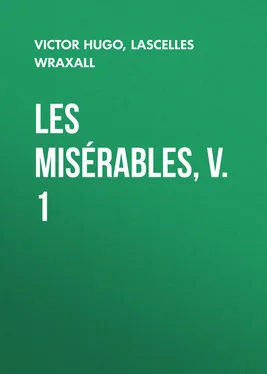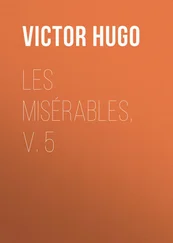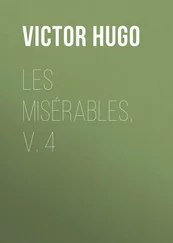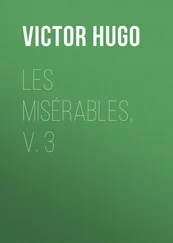Lascelles Wraxall - Les Misérables, v. 1
Здесь есть возможность читать онлайн «Lascelles Wraxall - Les Misérables, v. 1» — ознакомительный отрывок электронной книги совершенно бесплатно, а после прочтения отрывка купить полную версию. В некоторых случаях можно слушать аудио, скачать через торрент в формате fb2 и присутствует краткое содержание. Жанр: literature_19, foreign_antique, foreign_prose, на английском языке. Описание произведения, (предисловие) а так же отзывы посетителей доступны на портале библиотеки ЛибКат.
- Название:Les Misérables, v. 1
- Автор:
- Жанр:
- Год:неизвестен
- ISBN:нет данных
- Рейтинг книги:4 / 5. Голосов: 1
-
Избранное:Добавить в избранное
- Отзывы:
-
Ваша оценка:
- 80
- 1
- 2
- 3
- 4
- 5
Les Misérables, v. 1: краткое содержание, описание и аннотация
Предлагаем к чтению аннотацию, описание, краткое содержание или предисловие (зависит от того, что написал сам автор книги «Les Misérables, v. 1»). Если вы не нашли необходимую информацию о книге — напишите в комментариях, мы постараемся отыскать её.
Les Misérables, v. 1 — читать онлайн ознакомительный отрывок
Ниже представлен текст книги, разбитый по страницам. Система сохранения места последней прочитанной страницы, позволяет с удобством читать онлайн бесплатно книгу «Les Misérables, v. 1», без необходимости каждый раз заново искать на чём Вы остановились. Поставьте закладку, и сможете в любой момент перейти на страницу, на которой закончили чтение.
Интервал:
Закладка:
"Progress must believe in God, and the good cannot have impious servants. A man who is an atheist is a bad guide for the human race."
The ex-representative of the people did not reply. He trembled, looked up to the sky, and a tear slowly collected in his eye. When the lid was full the tear ran down his livid cheek, and he said in a low, shaking voice, as if speaking to himself, —
"Oh thou! oh ideal! thou alone existest!"
The Bishop had a sort of inexpressible commotion; after a silence the old man raised a finger to heaven and said, —
"The infinite is. It is there. If the infinite had not a me, the I would be its limit; it would not be infinite; in other words, it would not be. But it is. Hence it has a me. This I of the infinite is God."
The dying man uttered these words in a loud voice, and with a shudder of ecstasy as if he saw some one. When he had spoken his eyes closed, for the effort had exhausted him. It was evident that he had lived in one minute the few hours left him. The supreme moment was at hand. The Bishop understood it; he had come here as a priest, and had gradually passed from extreme coldness to extreme emotion; he looked at these closed eyes, he took this wrinkled and chilly hand and bent down over the dying man.
"This hour is God's. Would you not consider it matter of regret if we had met in vain?"
The Republican opened his eyes again; a gravity which suggested the shadow of death was imprinted on his countenance.
"Monsieur le Bishop," he said, with a slowness produced perhaps more by the dignity of the soul than by failing of his strength, "I have spent my life in meditation, contemplation, and study. I was sixty years of age when my country summoned me and ordered me to interfere in its affairs. I obeyed. There were abuses, and I combated them; tyranny, and I destroyed it; rights and principles, and I proclaimed and confessed them; the territory was invaded, and I defended it; France was menaced, and I offered her my chest; I was not rich, and I am poor. I was one of the masters of the State; the bank cellars were so filled with specie that it was necessary to prop up the walls, which were ready to burst through the weight of gold and silver, but I dined in the Rue de l'Arbre Sec, at two-and-twenty sous a head. I succored the oppressed. I relieved the suffering. I tore up the altar cloth, it is true, but it was to stanch the wounds of the country. I ever supported the onward march of the human race towards light, and I at times resisted pitiless progress. When opportunity served, I protected my adversaries, men of your class. And there is at Peteghem in Flanders, on the same site where the Merovingian Kings had their summer palace, a monastery of Urbanists, the Abbey of St. Claire en Beaulieu, which I saved in 1793. I did my duty according to my strength, and what good I could. After which I was driven out, tracked, pursued, persecuted, maligned, mocked, spat upon, accursed, and proscribed. For many years I have felt that persons believed they had a right to despise me. My face has been held accursed by the poor ignorant mob, and, while hating no one, I accepted the isolation of hatred. Now, I am eighty-six years of age and on the point of death; what have you come to ask of me?"
"Your blessing!" said the Bishop, and knelt down. When the Bishop raised his head again, the conventionalist's countenance had become august: he had just expired. The Bishop returned home absorbed in the strangest thoughts, and spent the whole night in prayer. On the morrow curious worthies tried to make him talk about G – the Republican, but he only pointed to heaven. From this moment he redoubled his tenderness and fraternity for the little ones and the suffering.
Any allusion to "that old villain of a G – " made him fall into a singular reverie; no one could say that the passing of that mind before his, and the reflection that great conscience cast upon his, had not something to do with this approach to perfection. This "pastoral visit" nearly created a stir among the small local coteries.
"Was it a bishop's place to visit the death-bed of such a man? It was plain that he had no conversion to hope for, for all these Revolutionists are relapsed! Then why go? what had he to see there? He must have been very curious to see the fiend carry off a soul."
One day a Dowager, of the impertinent breed which believes itself witty, asked him this question, "Monseigneur, people are asking when your Grandeur will have the red cap?" "Oh, oh!" the Bishop answered, "that is an ominous color. Fortunately those who despise it in a cap venerate it in a hat."
CHAPTER XI
A RESTRICTION
We should run a strong risk of making a mistake were we to conclude from this that Monseigneur Welcome was "a philosophic bishop," or "a patriotic curé." His meeting, which might almost be called his conjunction, with the conventionalist G – produced in him a sort of amazement, which rendered him more gentle than ever. That was all.
Though Monseigneur was anything rather than a politician, this is perhaps the place to indicate briefly what was his attitude in the events of that period, supposing that Monseigneur ever dreamed of having an attitude. We will, therefore, go back for a few years. A short time after M. Myriel's elevation to the Episcopate, the Emperor made him a Baron, simultaneously with some other bishops. The arrest of the Pope took place, as is well known, on the night of July 5, 1809, at which time M. Myriel was called by Napoleon to the Synod of French and Italian Bishops convened at Paris. This Synod was held at Notre Dame and assembled for the first time on June 15, 1811, under the Presidency of Cardinal Fesch. M. Myriel was one of the ninety-five bishops convened, but he was only present at one session and three or four private conferences. As bishop of a mountain diocese, living so near to nature in rusticity and poverty, it seems that he introduced among these eminent personages ideas which changed the temperature of the assembly. He went back very soon to D – , and when questioned about this hurried return, he replied, "I was troublesome to them. The external air came in with me and I produced the effect of an open door upon them." Another time he said, "What would you have? those Messeigneurs are princes, while I am only a poor peasant bishop."
The fact is, that he displeased: among other strange things he let the following remarks slip out, one evening when he was visiting one of his most influential colleagues: "What fine clocks! What splendid carpets! What magnificent liveries! You must find all that very troublesome? Oh! I should not like to have such superfluities to yell incessantly in my ears: there are people who are hungry; there are people who are cold; there are poor, there are poor."
Let us remark parenthetically, that a hatred of luxury would not be an intelligent hatred, for it would imply a hatred of the arts. Still in churchmen any luxury beyond that connected with their sacred office is wrong, for it seems to reveal habits which are not truly charitable. An opulent priest is a paradox, for he is bound to live with the poor. Now, can a man incessantly both night and day come in contact with distress, misfortune, and want, without having about him a little of that holy wretchedness, like the dust of toil? Can we imagine a man sitting close to a stove and not feeling hot? Can we imagine a workman constantly toiling at a furnace, and have neither a hair burned, a nail blackened, nor a drop of perspiration, nor grain of soot on his face? The first proof of charity in a priest, in a bishop especially, is poverty. This was doubtless the opinion of the Bishop of D – .
We must not believe either that he shared what we might call the "ideas of the age" on certain delicate, points; he mingled but slightly in the theological questions of the moment, in which Church and State are compromised; but had he been greatly pressed we fancy he would have been found to be Ultramontane rather than Gallican. As we are drawing a portrait, and do not wish to conceal anything, we are forced to add that he was frigid toward the setting Napoleon. From 1813 he adhered to or applauded all hostile demonstrations, he refused to see him when he passed through on his return from Elba, and abstained from ordering public prayers for the Emperor during the Hundred Days.
Читать дальшеИнтервал:
Закладка:
Похожие книги на «Les Misérables, v. 1»
Представляем Вашему вниманию похожие книги на «Les Misérables, v. 1» списком для выбора. Мы отобрали схожую по названию и смыслу литературу в надежде предоставить читателям больше вариантов отыскать новые, интересные, ещё непрочитанные произведения.
Обсуждение, отзывы о книге «Les Misérables, v. 1» и просто собственные мнения читателей. Оставьте ваши комментарии, напишите, что Вы думаете о произведении, его смысле или главных героях. Укажите что конкретно понравилось, а что нет, и почему Вы так считаете.












